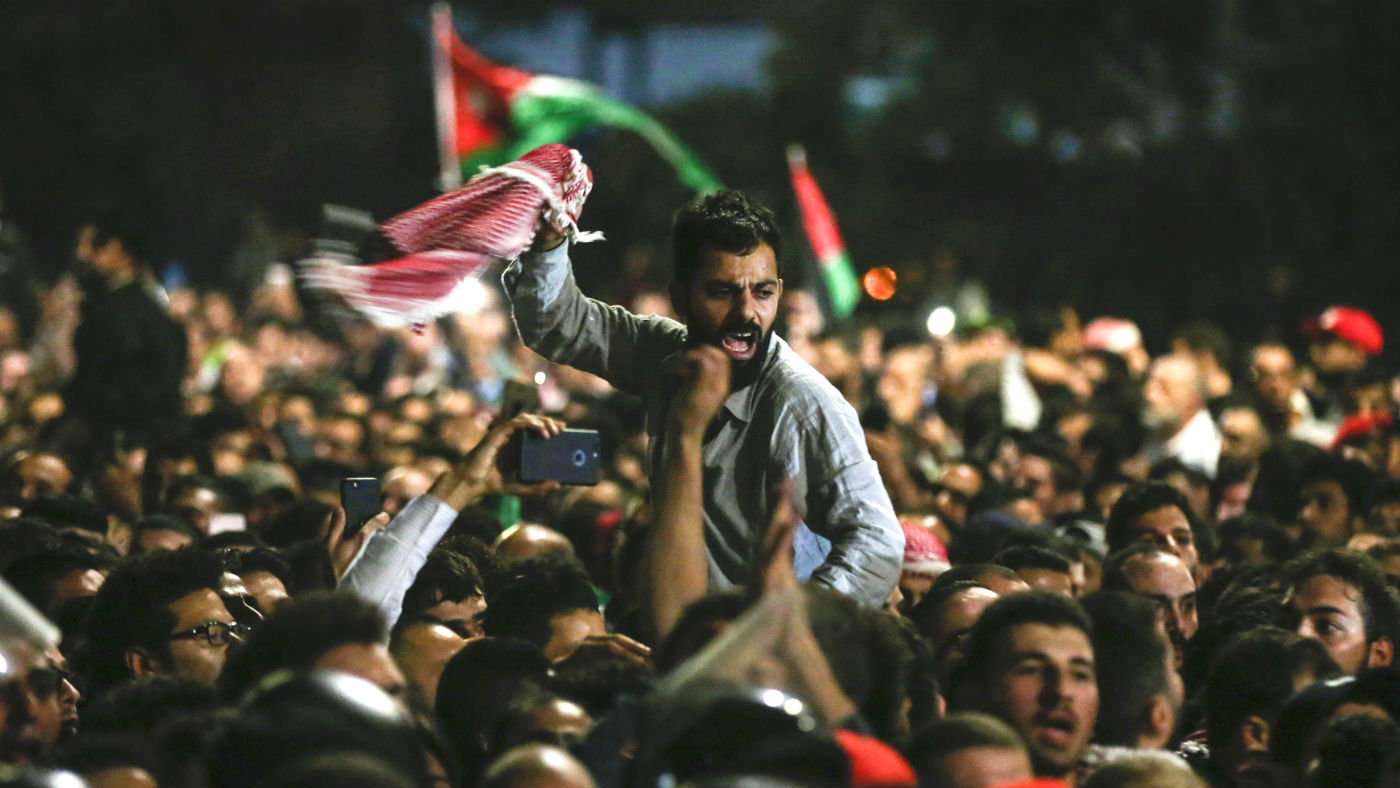Jordan protests: what are they about?
King replaces prime minister in bid to diffuse anti-austerity demonstrations

A free daily email with the biggest news stories of the day – and the best features from TheWeek.com
You are now subscribed
Your newsletter sign-up was successful
The King of Jordan has sought to diffuse growing unrest in the country by replacing his prime minister following days of anti-austerity protests.
King Abdullah has asked former World Bank economist Omar al-Razzaz to form a new government after Hani Mulki resigned as prime minister following the country’s biggest demonstrations in years.
In Jordan, “the monarch has extensive powers and can appoint governments and approve legislation”, says the BBC.
The Week
Escape your echo chamber. Get the facts behind the news, plus analysis from multiple perspectives.

Sign up for The Week's Free Newsletters
From our morning news briefing to a weekly Good News Newsletter, get the best of The Week delivered directly to your inbox.
From our morning news briefing to a weekly Good News Newsletter, get the best of The Week delivered directly to your inbox.
What caused the protests?
Planned tax hikes and the abolition of bread subsidies have brought thousands of people out onto the streets over the past week, in a rare show of public defiance in a country that has remained relatively stable through years of regional turmoil.
Security forces have detained 60 people for breaking the law during the protests and 42 security force members had been injured, but police say protests remained under control.
Why are taxes rising?
A free daily email with the biggest news stories of the day – and the best features from TheWeek.com
Reuters says Jordan’s economy has “struggled to grow in the past few years in the face of chronic deficits, as private foreign capital and aid flows have declined”.
The government claims it needs more funds for public services but opponents says the tough IMF-imposed fiscal consolidation plan has worsened the plight of poorer Jordanians and squeezed the middle class.
What happens next?
A general strike has been called for Wednesday, but in a sign the tax hikes could be shelved, the Petra news agency said lawmakers were planning to ask the king’s permission to hold an exceptional session in which a majority were expected to call on the changes be withdrawn.
-
 The ‘ravenous’ demand for Cornish minerals
The ‘ravenous’ demand for Cornish mineralsUnder the Radar Growing need for critical minerals to power tech has intensified ‘appetite’ for lithium, which could be a ‘huge boon’ for local economy
-
 Why are election experts taking Trump’s midterm threats seriously?
Why are election experts taking Trump’s midterm threats seriously?IN THE SPOTLIGHT As the president muses about polling place deployments and a centralized electoral system aimed at one-party control, lawmakers are taking this administration at its word
-
 ‘Restaurateurs have become millionaires’
‘Restaurateurs have become millionaires’Instant Opinion Opinion, comment and editorials of the day
-
 Epstein files topple law CEO, roil UK government
Epstein files topple law CEO, roil UK governmentSpeed Read Peter Mandelson, Britain’s former ambassador to the US, is caught up in the scandal
-
 Iran and US prepare to meet after skirmishes
Iran and US prepare to meet after skirmishesSpeed Read The incident comes amid heightened tensions in the Middle East
-
 Israel retrieves final hostage’s body from Gaza
Israel retrieves final hostage’s body from GazaSpeed Read The 24-year-old police officer was killed during the initial Hamas attack
-
 China’s Xi targets top general in growing purge
China’s Xi targets top general in growing purgeSpeed Read Zhang Youxia is being investigated over ‘grave violations’ of the law
-
 Panama and Canada are negotiating over a crucial copper mine
Panama and Canada are negotiating over a crucial copper mineIn the Spotlight Panama is set to make a final decision on the mine this summer
-
 Why Greenland’s natural resources are nearly impossible to mine
Why Greenland’s natural resources are nearly impossible to mineThe Explainer The country’s natural landscape makes the task extremely difficult
-
 Iran cuts internet as protests escalate
Iran cuts internet as protests escalateSpeed Reada Government buildings across the country have been set on fire
-
 US nabs ‘shadow’ tanker claimed by Russia
US nabs ‘shadow’ tanker claimed by RussiaSpeed Read The ship was one of two vessels seized by the US military